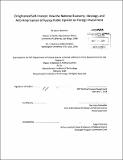Enlightened self-interest : how the national economy, ideology, and anti-Americanism influence public opinion on foreign investment
Author(s)
Lawrence, Joyce (Joyce Marie)
DownloadFull printable version (4.032Mb)
Alternative title
How the national economy, ideology, and anti-Americanism influence public opinion on foreign investment
Other Contributors
Massachusetts Institute of Technology. Department of Political Science.
Advisor
Ben Ross Schneider.
Terms of use
Metadata
Show full item recordAbstract
Despite the benefits of economic globalization, popular opposition to foreign investment continues to influence policy debates. What explains opposition to foreign investment? Standard political economy theories suggest that support for international trade, immigration, and investment all depend on the impact these policies have on potential earnings in the labor market. According to standard models, those who stand to benefit economically from international exchange are expected to be more supportive than those who will face increased competition and declining wages. An analysis of four cross-national surveys from 57 countries provides empirical evidence that public opinion on foreign investment is not determined by economic self-interest, but rather by evaluations of the national economy, political ideology, and attitudes about the United States. These findings have implications for understanding the debate over globalization policy and domestic support for further liberalization around the world..
Description
Thesis: S.M., Massachusetts Institute of Technology, Department of Political Science, February 2014. "February 2014." Cataloged from PDF version of thesis. Includes bibliographical references (pages 64-66).
Date issued
2014Department
Massachusetts Institute of Technology. Department of Political SciencePublisher
Massachusetts Institute of Technology
Keywords
Political Science.